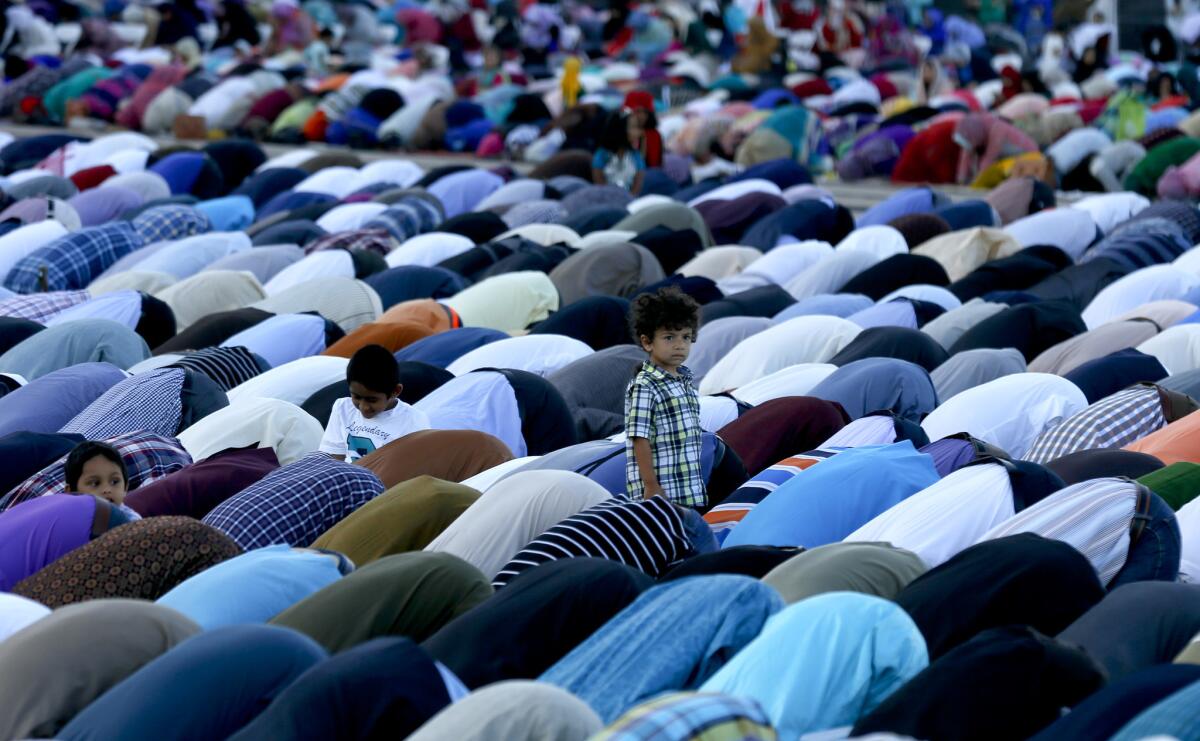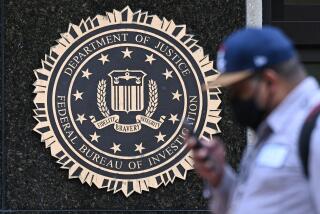Can FBI be held liable for targeting Irvine Muslims for surveillance?

Orange County Muslims gather in prayer in the parking lot of Angel Stadium in Anaheim for Eid al-Adha to mark the end of the annual pilgrimage to Mecca known as Hajj on Sept. 23.
Craig Monteilh told the imam that he wanted to embrace his French and Syrian heritage and convert to Islam.
Monteilh adopted an Islamic name, donned Muslim robes and a skull cap, and attended prayers vigilantly. The Islamic Center of Irvine embraced him — until he began talking of violent jihad.
Congregants reported him to the FBI and Irvine police, and then obtained a restraining order against him. Only later did they discover Monteilh was working for the FBI.
A federal appeals court is now considering whether the FBI can be held liable for allegedly indiscriminately targeting Muslims for surveillance. If the court decides the FBI cannot defend itself without revealing state secrets, the court likely would uphold the dismissal of a class-action lawsuit brought by Southern California Muslims.
Join the conversation on Facebook >>
The review by the U.S. 9th Circuit Court of Appeals comes at a time of heightened fear of terrorism and incidents of backlash against innocent Muslims.
Judge Marsha Berzon, in a hearing this month, acknowledged the sensitivity of the matter as she struggled to understand what constituted a state secret. The state secrets doctrine bars litigation of a case if it would expose or threaten to expose matters of national security.
“I just am having real trouble seeing where the line is drawn in this very difficult situation we are in now,” Berzon, a Clinton appointee, told a government lawyer.
The government argued it could not defend itself without disclosing state secrets. U.S. District Judge Cormac J. Carney agreed with the government in 2012, dismissing the bulk of the lawsuit on the grounds it would require disclosure of matters vital to national security. Carney reviewed classified information before his decision.
The Southern California Muslim community, represented by the ACLU of Southern California, believes the FBI targeted people solely because of their religion and should be held accountable.
Muslim leaders complained that the spying mission eroded trust in law enforcement at a time when the government needs help from the Muslim community to fight terror.
“The fundamental question is will we be viewed as partners or suspects?” said Edina Likovic, speaking for the Los Angeles-based Muslim Public Affairs Council. “The fear here is that we are being treated publicly as partners and privately as suspects.”
About 500,000 Muslims live in Southern California, with more than 120,000 in Orange County, the second-largest population of Muslims in the United States.
Monteilh, who had a falling out with the FBI, has been working with the ACLU.
“I am the principal witness,” said the Irvine resident, 53. “All the information they got came from me.”
Monteilh said the FBI paid him $177,000 to infiltrate about 12 mosques in Orange, Los Angeles and San Bernardino counties over the course of 14 months, starting in June 2006. He said his job was to gather as many cellphone numbers and email addresses as possible and to find Muslims who could be compromised because of immigration, sexual or business issues.
Posing as a fitness consultant, Monteilh frequently worked out with Muslims at the gym and secretly recorded them, he said.
“This surveillance was so fruitful that Monteilh’s handlers eventually told him they were seeking approval to have him open a Muslim gym,” the suit said.
When he agreed to attend prayers at dawn four days a week, he received a pay increase, the suit said. His handlers told him to write down the license plate numbers of the cars in the parking lot, he said.
But at times his devotion raised eyebrows. He attended lessons in Arabic — a language he didn’t speak.
He also appeared to be extremely absent-minded. Congregants remembered that he was forever leaving his keys or his cellphone behind. Monteilh later said his phone and a fob on his keys contained recording devices.
During the hearing, a lawyer for the FBI agents said Monteilh had signed a contract saying he would not leave listening devices unattended. Monteilh said he signed no such contract, and the agents knew what he was doing.
Monteilh said he secretly videotaped Muslims through a camera hidden in a button in the front of his shirt.
His identity was revealed during a court hearing. He had a criminal record, and the FBI helped him get off probation early, according to a court transcript.
Monteilh later accused the FBI of breaking promises to him. The FBI has said it does not target people because of their religion and that Monteilh signed a confidentiality agreement.
Monteilh, who unsuccessfully sued the FBI, said he has no regrets about his undercover work. He learned about FBI techniques and methods and policies and now works as a consultant on counterterrorism, he said. His mission unveiled the government’s scrutiny of Muslims, he said.
“If I didn’t work that case, they would never know they were being spied on 24 hours a day,” Monteilh said.
He said his work identified terrorists overseas, although it did not lead to convictions of local Muslims. Monteilh also said he understands why the FBI conducted the surveillance.
“Let’s face it, they have to,” he said. “That is the only method they can use to be preemptive.”
It could take several months before the 9th Circuit rules.
Berzon was the only judge on the panel who asked questions during the hearing. The other two reviewing the case are 9th Circuit Judge Ronald M. Gould and Judge George Caram Steeh III, a district judge from Michigan, both Clinton appointees.
Although she was skeptical of both sides, Berzon told attorneys for the government that their arguments were “circular.”
She also observed that another circuit court had found that the government could not invoke the state secret privilege in a lawsuit unless the secrets were an integral part of the government’s “meritorious defense,” not just a possible defense, an issue a court would have to determine.
“We certainly can’t do that if you can’t tell us your defense,” she said.
Monteilh said he has remained a Muslim, though his conversion initially was a ruse. He said he prays five times a day, studies the Koran and fasts.
But he does not attend a mosque.
“People would freak out if they saw me,” he said. “I am a former FBI informant, and that will always be with me.”
Twitter: @mauradolan
More to Read
Get the Latinx Files newsletter
Stories that capture the multitudes within the American Latinx community.
You may occasionally receive promotional content from the Los Angeles Times.







